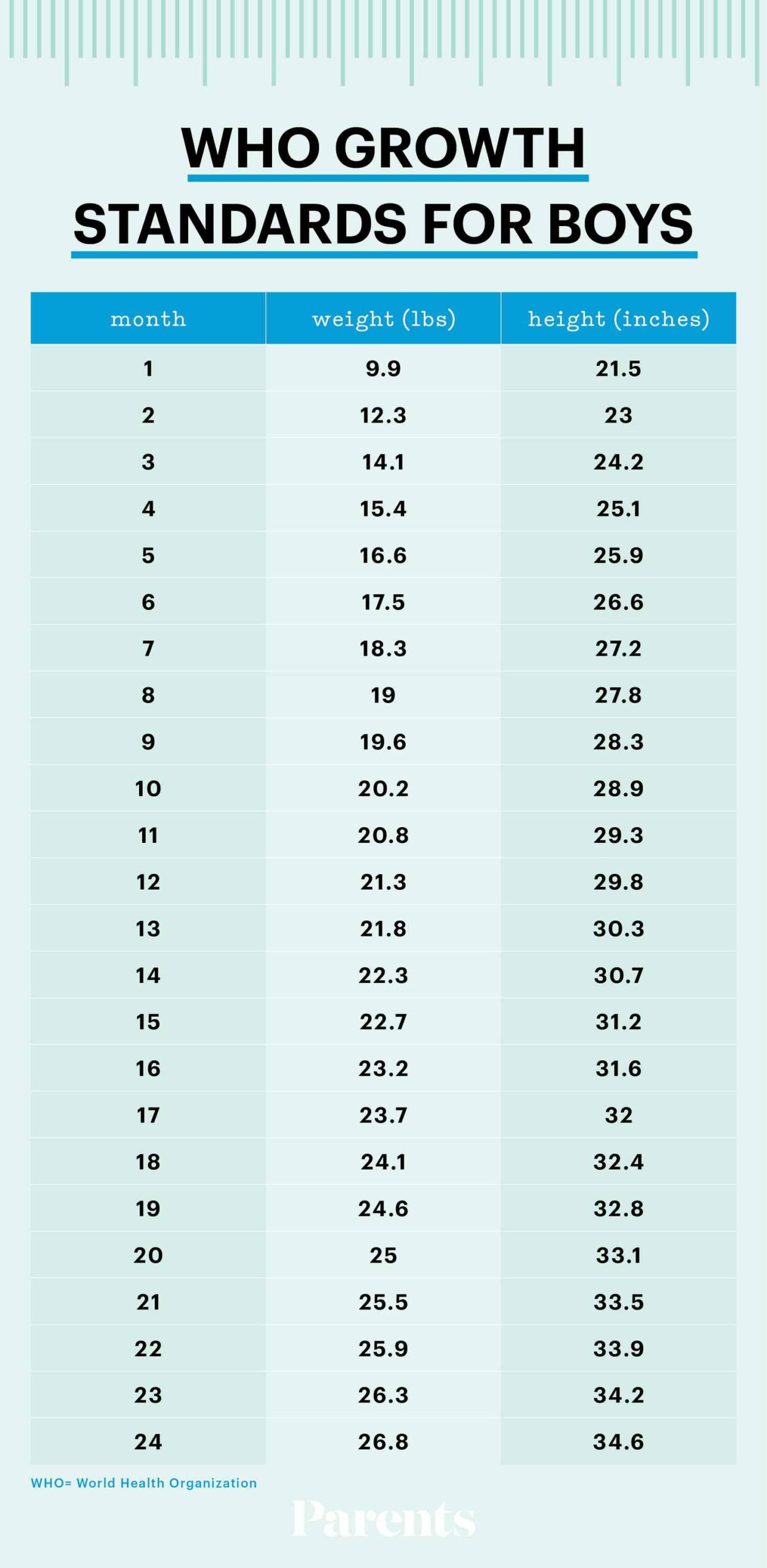Monitoring your child’s weight is crucial for assessing their health and development. The boys’ weight chart provides standard measurements for the average weight of boys at different ages, usually based on data from the World Health Organization (WHO). This article will guide parents on how to use the WHO Weight Chart for Newborn and Infant Boys.
How to Use the Weight Chart for Newborn and Infant Boys
Reading the Chart: The WHO boys’ weight chart typically shows the relationship between three factors: height,weight, and age. The percentile curves on the chart indicate the percentage of children of the same age and gender who have reached a certain weight.
Assessment: After measuring and locating your child’s position on the weight chart, you can make a preliminary assessment:
- Normal development: The child’s weight falls within the 3rd to 97th percentile range.
- Underweight: The child’s weight is below the 3rd percentile.
- Overweight or obese: The child’s weight is above the 97th percentile.
Factors Affecting Boys’ Weight
- Genetics: A child may inherit weight tendencies from parents or relatives.
- Nutrition: Breast milk is the optimal source of nutrition for infants. After 6 months, a balanced diet with adequate nutrients is also crucial.
- Physical activity: Children who are physically active tend to have better overall physical development.
- Medical conditions: Certain medical conditions can affect nutrient absorption and lead to slow weight gain.
Babies can inherit weight tendencies from their parents or family members
Weight Chart for Newborn and Infant Boys by Month
Parents can refer to the WHO standard weight chart for boys (Provide chart here). Note: This chart is for reference only; do not be overly concerned if your child’s weight fluctuates slightly from the standard figures.

When to Consult a Doctor
Parents should take their child to a pediatrician if they notice the following signs:
- Weight loss or no weight gain for an extended period.
- Excessive weight gain, exceeding the percentile lines on the growth chart.
- Loss of appetite, refusal to breastfeed, frequent vomiting, or other unusual symptoms.
Tips for Caring for a Healthy Newborn Boy
- Exclusively breastfeed for the first 6 months. If not possible, choose a suitable formula as advised by your doctor.
- Introduce solids properly and with a variety of foods after 6 months of age.
- Monitor your child’s weight regularly and take them for regular check-ups.
The boys’ weight chart is a useful tool, but parents should remember that it is just one factor in assessing a child’s health. Pay attention to your child’s overall development and consult with your pediatrician for the most accurate assessment.
Frequently Asked Questions about Weight Chart for Newborn and Infant Boys
My son is below the 3rd percentile on the boys’ weight chart. Is he underweight?
-
- A weight below the 3rd percentile indicates that your child weighs less than most boys of the same age.This could be due to various reasons (genetics, diet, etc.). Consult a pediatrician for an accurate assessment and solutions.
My son is very chubby. Is he overweight? How can I tell if my son is overweight or obese?
-
- If your child’s weight is above the 97th percentile on the boys’ weight chart, he is at high risk of being overweight or obese. It’s best to consult a doctor for specific advice and avoid prolonged overweight or obesity, as it can lead to health problems later in life.
Is it necessary to monitor the newborn boys’ weight chart regularly?
-
- Yes. Infants grow rapidly in the first few months, so monitoring the newborn boys’ weight chart regularly (about 1-2 times a month) helps parents detect any abnormalities (if any) for early intervention.
Besides weight, what other factors should I consider to assess my son’s development?
-
- Besides weight, parents should pay attention to their child’s height, motor development milestones (rolling over, crawling, sitting, walking), mental and emotional development, and communication skills. Overall development is a sign that your child is growing up healthy.
Do breastfed boys have a different weight chart than formula-fed boys?
-
- Yes, in general, breastfed babies tend to gain weight slightly slower than formula-fed babies in the early stages. However, both have their own growth standards, and parents can refer to the WHO boys’ weight chart for monitoring.

In general, in the early stages, breastfed babies often gain weight a little slower than formula-fed babies
Scientific References
- WHO study on child growth:
- Organization: World Health Organization (WHO)
- Study name: “WHO Child Growth Standards: Growth Length and Weight”
- Year of publication: 2020
- Content: The study provides standard weight and height charts for children aged 0-5 years, developed based on data from over 80 countries.
- Scientific article on the impact of diet on boys’ weight:
- Journal: Nutrients
- Article title: “Dietary Patterns and Infant Growth: A Systematic Review and Meta-Analysis”
- Authors: Ling Lin, et al.
- Year of publication: 2019
- Results: The study found that a diet rich in protein and fat is associated with better weight gain in male infants.
This article provides information about Weight Chart for Newborn and Infant Boys and related knowledge. I hope this article is helpful to you.
References:
Average baby weight: Chart and development – Medical News Todaymedicalnewstoday·1
Kiểm Duyệt Nội Dung
More than 10 years of marketing communications experience in the medical and health field.
Successfully deployed marketing communication activities, content development and social networking channels for hospital partners, clinics, doctors and medical professionals across the country.
More than 6 years of experience in organizing and producing leading prestigious medical programs in Vietnam, in collaboration with Ho Chi Minh City Television (HTV). Typical programs include Nhật Ký Blouse Trắng, Bác Sĩ Nói Gì, Alo Bác Sĩ Nghe, Nhật Ký Hạnh Phúc, Vui Khỏe Cùng Con, Bác Sỹ Mẹ, v.v.
Comprehensive cooperation with hundreds of hospitals and clinics, thousands of doctors and medical experts to join hands in building a medical content and service platform on the Doctor Network application.


























